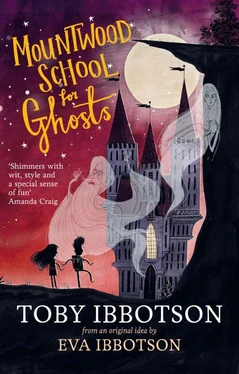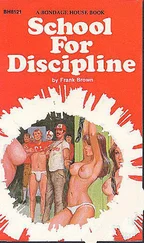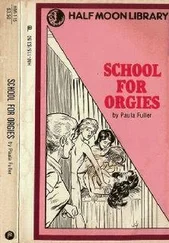‘An accident, oh dear,’ said Drusilla, sitting up in the back seat where she had been resting. She had worked hard sorting out the mess that was the Grim Ghoul’s digestive system and was rather tired.
‘Accident? I have my doubts,’ said Fredegonda grimly. Her thumb was pricking and tickling as it sometimes did when things were afoot. The Hagges got out of the car and walked towards Vince’s body. They stood looking down at the chalky horror-struck face.
‘Well, well. Scared to death,’ said Fredegonda.
‘Unfortunately not. Only comatose, I’m afraid,’ said Drusilla in a disappointed voice. She had already been having a number of little culinary ideas — roadkill is roadkill after all.
Fredegonda frowned. ‘You would think,’ she said, ‘that one night off was not too much to ask. There has been a serious breach of discipline. There have been pranks; there have been high jinks. And they didn’t even complete the job. What shall we do?’
‘Shall we just finish him off and leave him?’ suggested Goneril, looking around for a large stone.
‘Quite impossible, I’m afraid. The police are terribly good at this kind of thing nowadays. They will work out that he didn’t die in the crash and start poking around. Drusilla, can you come up with something?’
‘I can bring him round, I think,’ said Drusilla, and went back to the car.
She came back with a small phial, uncorked it and asked, ‘Could you help me, Goneril dear?’
Goneril took hold of Vince’s ankles and lifted him up so that he was hanging upside down from her outstretched arms, limp as a bin bag. Drusilla knelt down and poured a few drops from her phial into Vince’s left nostril, counting carefully as she did so, ‘One, two, three, and one for luck.’
Goneril put him down. Suddenly he spluttered, arched his back and then leaped to his feet, staring wildly around him and waving his arms.
‘No… get off me… I won’t… Aargh!’ he howled.
They threw Vince on to the back seat of the Rolls and drove off. While he babbled and screeched and wept, Drusilla went through his pockets.
‘Vincent Grafton,’ she said, after finding his driving licence and a couple of unpaid bills. ‘Twenty-one Lavender Terrace, Matherley. He was obviously on his way home.’
After coasting quietly around the housing estates on the outskirts of Matherley, the Hagges found the right house.
Goneril got out of the car, fetched Vince from the back seat and tucked him under her arm. She walked up to the door of number twenty-one, dropped him on the front step, rang the bell and went back to the car.
The Great Hagges sat in silence for a while, watching. A light went on in an upstairs room, and a few seconds later the front door opened slowly. In the glow of the porch light they saw a woman, still young but with marks of weariness and despair on her face, bend over the huddled shape on her doorstep.
‘Vince?’ they heard her say.
Vince Grafton crept past her on all fours into the house. He never left it again. After a long time he recovered slightly. He learned to sew, and to cook healthy food, and he even found out where the vacuum cleaner was kept. His wife found a nice job in the library, and every day she locked him in carefully before leaving the house. He insisted on it. Sometimes on a Sunday she suggested a little stroll by the river. But Vincent always refused, trembling in every limb.
‘Not going out there,’ he said. ‘Meg’s out there.’
Eighteen
The Markham Street March
Daniel and Charlotte were in Daniel’s attic room, sitting on the low windowsill.
They had lost. The results of the inquiry had been announced, with articles in the newspaper and reports on the local news station. Work would start soon in the park, and in a month or two the demolition of Markham Street would begin.
Rain was falling in a steady determined way, as though to say that it had got into its stride and wasn’t planning on letting up any time soon. It drummed on the roof slates and gurgled in the guttering. Now and then, when a gust of wind shook the leaves of the chestnut tree on the other side of the street, it smattered against the windowpane.
‘The Bennetts are moving tomorrow; I met Gillian on the way home from school,’ said Charlotte.
‘I heard.’
‘How about you?’
‘I think we’ll go to that place on Wellington Road. My dad says that the compensation money should be enough. At least he’ll have a bit of garden out the back.’
I can’t believe it’s over, Daniel. I just can’t.’ Charlotte leaned her forehead against the windowpane.
‘It isn’t over, Charlie. Not until they swing a wrecking ball through our front door.’
‘I get the Hector thing, Daniel, I really do. But this is real. It’s not an old story about Helen of Troy.’
‘Come on, Charlotte. You’re Boudicca, remember. What are we going to do now?’
Mrs Wilder was wondering the same thing.
Jessie and Mr Jaros had come over for a cup of tea. Jessie had struggled up the stairs to the big room on the first floor and flopped gratefully down in front of the gas fire, where she instantly fell asleep. Mrs Wilder and Mr Jaros sat opposite each other in comfortable chairs, and while Mr Jaros nibbled silently on his biscuit, and the rain pattered on the windows, Mrs Wilder considered the situation.
She didn’t feel like giving up quite yet. A small modern flat somewhere in the suburbs had not been part of her plans at all. She had planned on dying in her own bed, or preferably at her desk, in Markham Street, with Karin to arrange the flowers and Peter Richards playing some Schubert with a few friends from the orchestra. And that sweet girl Charlotte, who really had a lovely speaking voice, could do the reading. They were all so kind and thoughtful in that peaceful way that never made you feel as though they were doing you a favour. She had found a home in Markham Street, and although they would never know it, for she would never tell them, they had mended her heart, the heart that was broken so very many years ago when she climbed on to that train, with a number on a label round her neck, and waved goodbye to her parents.
She had been Lottie Weissman then, a nine-year-old girl from Austria, and all she had when she came to England was a small cardboard suitcase and the address of one of her father’s friends, stitched on to the inside of her coat. She hadn’t known then how bad it would be. Being sent away from her parents was painful enough, but the worst of it, the whole truth, came out later. Her mother and father had been swept away by the horrible war that followed, and were gone forever.
She had worked hard at making a good life and becoming a writer; she was grateful for her escape, and grateful to her new country for making it possible. But it wasn’t until she settled in Markham Street that she found again the feeling of having a real home. Mrs Wilder knew, more than anyone else on the street, what they were fighting for. Not just for some nice old houses, but for the place where they belonged. Home.
‘You know, Fjodor,’ she said aloud, ‘we really shouldn’t let that Bluffit man get away with this. The whole of City Hall seems to do what he says. I have been talking to Sam Norton, who wrote that article. He’s been digging around and he says that there was some kind of a deal between Bluffit and that buffoon Ridget — a housing scheme on Ridget’s estate that he wanted stopped. But he can’t prove it. Or not yet, anyway. We should give him all the help we can. If he can show that the whole inquiry was a farce, then they will at least have to reopen it.’
Mr Jaros was in a deep Central European gloom. ‘Help him? How can we help him? We are crushed by the forces of capital. We are downtrodden.’ In his younger days Mr Jaros had been a bit of a firebrand, but things had happened to him in Prague that had dampened his fervour.
Читать дальше












